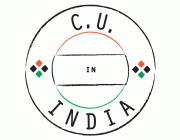
The South Asia Center has launched C.U. in India, a hybrid study abroad program open to Penn undergraduates. It is designed for students who would like the study abroad experience but are unable to commit to the semester or year-long options that study abroad programs typically entail. Instead C.U. in India allows students who sign up for a once a week class during the fall and spring semester to participate on a 12-day trip to India with their instructor(s) during winter break to visit key sites and conduct original research.
...............................................
INTERVIEW WITH ORGANIZERS
What is C.U. in India and what does it aim to accomplish?
Jody: C.U. in India is a new, hybrid, domestic/overseas course series in which Penn undergraduate students can travel to India as part of their enrollment in intensive 2-CU courses. The idea for the program grew out of a 2012 conversation between South Asia Center and Penn Abroad staff members, where we learned that Penn undergraduates were traveling to India during the academic year in extremely small numbers. We believe that travel to South Asia can be one of the most transformative experiences of one's education, and so we decided to try a different model for study abroad. The opportunity to complete part of their coursework on campus during the semester and the remainder during the winter break will allow even those students who want to take part in On-Campus Recruiting opportunities to be able to go to India as part of their Penn education. The courses will be piloted in academic year 2014-15, and if successful, we plan to introduce new course topics each year as part of the series.
Who should apply to CU in India?
Jody: Any Penn undergraduate with a genuine interest in learning about India, who is tolerant, able to function well as part of a team, and can travel under rigorous conditions.
Is prior experience in India or familiarity with the region a prerequisite to apply? Are there any prerequisites for applying to the program?
Jody: Prior experience in India is not required, and there are no prerequisites for the program. However, we are looking for students who are mature, open-minded, and flexible. The itineraries for the India trips are very intensive, so people need to be prepared for this, mentally and physically.
What will the fall and spring courses on campus look like in terms of class requirements and expectations?
Raili: During the fall semester, class readings and discussions will provide students with the methodological and theoretical background to enable them to analyze their direct observations, site visits, and hands-on experiences in India. At the end of the fall semester, students will submit a prospectus detailing the research questions that guide their independent research projects during the 12 day stint in India.
Pushkar: After returning from the 12-day India component of the course, which will be a highly-structured period for students to gain the most out of their brief time in the country, the courses will continue in the spring semester. The spring semester will be used to help students gain familiarity with library and other resources that will help them complete their final research papers. We will assign assignments leading up to the final paper deadline to help students successfully submit their papers on time.
What are this year's course offerings for C.U. in India and what will students gain from these courses?
Raili: Gender studies and development studies are both interdisciplinary in orientation, and touch on issues as diverse as work & family life, health & population, and labor & international economic change. Topics in Gender, Development, and Empowerment in India is designed to introduce students to the debates on development in India which are currently in flux with important implications for the practice and analysis of gender and development. Students will critically engage with the issues important to development planners, national leaders and women's groups throughout India. The India component of the course will enable students to meet women's rights activists and see NGOs operating in New Delhi and Kolkata.
Pushkar: Great Architectural Monuments of India will guide students through a two thousand year history of architectural practices in India. The architecture of India has been shaped by a multitude of cultural and natural factors over a long period of time. The movement of people, ideas and technologies did not always result in conflict, but more commonly created culturally hybrid worlds. The ability to adapt, innovate, improvise and absorb while retaining core ideals is best expressed in the material form of architecture. We will be visiting important archaeological and architectural sites in Delhi, Hyderabad, Kolkata, Mumbai, Aurangabad, and Ellora, that will allow students to directly engage with these built environments and their history.
How does Penn financial aid work in conjunction with the program?
Jody: Once a student is admitted to the program, those who are currently receiving Penn financial aid will receive an estimate from Student Financial Services indicating how their aid package will be recalculated to take the C.U. in India program fee ($5500 for one course, $8600 for both courses) into consideration. These estimates will be based on each individual student's family circumstances. Students will not be required to pay the $300 program deposit until after they have received the revised financial aid estimate. Additionally, we received a grant from the Provost's Global Engagement Fund to make a limited number of need-based, fee-waiver awards to students on financial aid.
Do you have a plan for future CU in India courses and instructors?
We are currently soliciting proposals from faculty members for the 2015-16 academic year. Academic year 2015-16 courses will be announced by October 2014 on the C.U. in India website.
